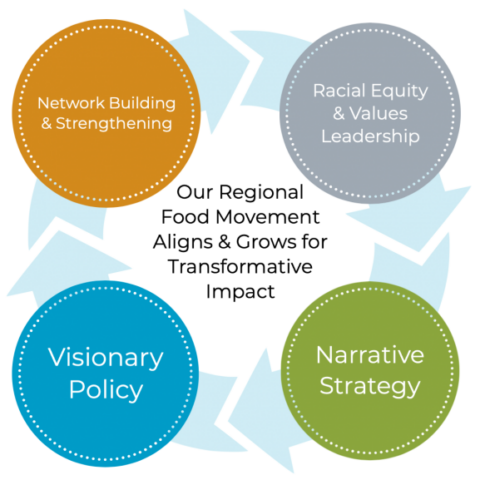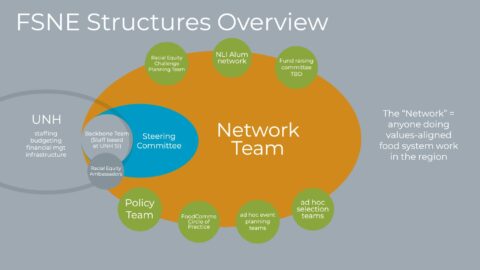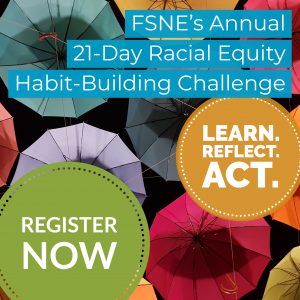Network Evolution: A Second Decade Brings More Diversity, Intricacy and Robustness
October 14, 2021 Leave a comment“Long term prosperity is primarily a function of healthy human webs.”
– Sally J. Goerner

“Networks are a thing.” That statement was made by the member of a partner network that we at IISC have been supporting for several years. The comment was meant to convey how increasingly people are recognizing the need to become more network literate as they work for social change, and also to put a finer point on the complexity of doing “net work.” Indeed, as intentional or impact networks evolve, they can often become much more “involved” and this is both good and challenging.
Food Solutions New England is a regional network that has moved into its second decade of work as a formally recognized multi-stakeholder collaborative, and along the way, participants have seen a constant evolution in how it understands itself and its work, as well as how it is organized and carries out its activities in the direction of its vision and grounded in a set of shared values. During a core team retreat last week, and a subsequent Steering Committee discussion, we did some stock taking and also projecting into the future, as uncertain as the latter may be. Where we came to rest is an appreciation of what has been built, much very emergently, over the last 10 years, and upon which the Network can build and certainly will continue to iterate.
So what does a 10 year old regional food systems network have to show for its efforts? Here is a (not quite complete) list, in case it is helpful to others as they evolve:
- New England Food Vision/Update planning/scaffolding – The New England Food Vision is a collaborative report that examines the history and considers the future of the region: a future in which food nourishes a social, economic, and environmental landscape that supports a high quality of life for everyone, including generations to come. The Vision was formally published in 2014 as a way of spurring the imagination of people around the region. It has helped to catalyze many conversations around what is possible and must to be done to ensure an equitable and resilient food future, and has helped to create alignment amongst efforts at local, state and regional levels. The Network has recently initiated a participatory process to bring the Vision up to date, both in terms of the data and potential scenarios presented in the original 2014 Vision, but also in response to our evolving world.
- Annual 21 Day Racial Equity Habit Building Challenge – The Challenge is an enhanced and more sector-specific form of an exercise created by Dr. Eddie Moore, Debbie Irving, and Dr. Marguerite W. Penick-Parks. After FSNE formalized its commitment to racial equity in its sustainable food system work about 8 years ago (more on this journey in this article), a small design team saw the potential of using the Challenge to invite more widespread conversation about the connection between race, racism and food systems and ultimately greater action for racial and food justice. This past April, the Challenge had 10,000 participants from around the region, country and world. Reports are that it has spurred many organizations to do DEIJ work internally, and has inspired Equity Summits and other organizing efforts in communities.
- Network Leadership Institute – FSNE launched its first Network Leadership Institute in 2016 to support food system advocates and leaders through skill-building, connect them with one another and the larger Network, and to engage them in the growing alignment around the FSNE Vision and Values. Each year, FSNE selects a diverse cohort who demonstrate deep engagement with and commitment to the New England food system for an immersive, experiential program designed to maximize learning and growth, reflection and connection, and inspiration and renewal. With this year’s (virtual) cohort, roughly 85 people will have been through the NLI, and many alumni have joined the Network Team and been guest faculty in the NLI.
- Winter Series – For the first six years of its existence, FSNE hosted an in-person regional Food Summit, which moved around the region to each of the six states. These were paused in 2017 in the name of doing deeper strategy development and implementation work, which resulted in the four Impact Areas to guide the network’s activities (see image above). Earlier this year, given the pandemic, the decision was made to host a series of virtual sessions where people could join together with others across the Food Solutions New England network to connect, learn, and get inspired. Each Friday morning in February 2021 featured a four hour gathering on one of the four impact areas.
- Narrative Toolkit and Communicators Community of Practice – As a result of a system mapping process in 2016-2017, the FSNE Network Team identified changing dominant narratives about food and food systems as a leverage point for moving the region in the direction of the Food Vision and Values. Since then, a Communications Director has been hired, a Narrative Toolkit has been developed, and a regional community of practice of food system communicators has been initiated to share resources and discuss aligning and coordinating efforts.
- Regional Policy Work – Since elevating regional food policy coordination to one of its four key “impact areas” in 2020, the FSNE network has been convening conversations about the role of the network in helping to move meaningful, collaborative and values-based food policy forward in the region. In addition to hosting online events in late 2020 and beginning work on a draft regional policy platform, FSNE hired a part-time Policy Analyst to help move this effort forward.
- The FSNE Pledge – The Network has created an opportunity for individuals and organizations to join and align with the FSNE Vision by signing the FSNE Pledge and demonstrating commitment to the Network’s values and the strengthening of the regional food system.
- An expanded and more representative Network Team. The Network Team is made up of food system participants from across the six New England states who share common values and are strategic, networked, practitioners from key sectors and cultural perspectives. The Network Team serves as the principal steward of the FSNE regional network, while cultivating greater connectivity and alignment around the FSNE Vision and Values, and supporting collaborative action to advance our network goals. The team works together to: identify key resources to support the network; maintain and evolve the collaborative culture and capacity of the network; ensure ongoing engagement and participation; model and affirm our commitment to racial justice; and share learnings and FSNE’s work with other networks and organizations.
- An expanded and more representative Steering Committee. The Steering Committee (formerly the Process Team) is a strategic “network stewardship” body that includes the Backbone staff as well as some current and former members of the Network Team. Specific responsibilities of the Steering Committee include: proposing and ensuring the integrity of the overall FSNE process; identifying and prioritizing key activities and opportunities with/for the Network Team; helping to draft documents related to network structure and governance; performing leadership duties assigned to the Steering Committee by the full network team, and helping to steward the FSNE network’s health overall.
- New Ambassadors and an expanded Ambassador Team. The Ambassador Team takes the FSNE Vision and Values and its commitment to racial equity to communities across the region. The Ambassadors’ work was launched in January 2015 in the most populated and diverse geographic area, the southernmost states of our region: Connecticut, Massachusetts, and Rhode Island. This team is expanding to all six states and works together to identify and make connections with new and diverse partners, organizations, and individuals; to create a space for more racially diverse leadership and mentorship opportunities for equity in the food system; and to ensure more connectivity between community efforts, the broader regional food system, and a racial equity agenda.
- A close partnership with New England Feeding New England. In 2019, the New England State Food System Planners Partnership launched the New England Feeding New England: Cultivating A Reliable Food Supply Project, a 10-year initiative to prepare the region for system shocks such as climate-related weather events and public health emergencies. NEFNE’s aim is to increase regional food production for regional consumption, striving to improve the reliability of our regional food system by strengthening supply chains and our goal is for 30% of food consumed in New England to be produced or harvested in the region by 2030.
- A close partnership with the Southern New England Farmers of Color Collaborative (SNEFCC). SNEFCC is a nascent organization of beginning farmers of color and collaborators who want to increase the success of farmers of color in Connecticut, Massachusetts, and Rhode Island. SNEFCC hopes to position farmers of color for new opportunities, and to provide them with the necessary skills and resources to build and sustain successful farm enterprises now and in the future. There is overlap between participants in this Collaborative and the FSNE Network Team, Steering Committee, and Ambassadors.
- Partnership and collaboration around holistic regional policy. Through a recent reconfiguration, a regional food policy network manager will work closely with staff at the Highstead Foundation, which serves as the coordinator backbone of Wildlands & Woodland along with the Harvard Forest. Both initiatives have strong collaborations with many NGOs as well as state and federal agencies across the six-state region.
- Ripples into neighboring states and other countries – FSNE core team and Steering Committee members are often asked to present about the network’s work. This has resulted in initiatives being sparked in other areas, near and far. Recently, inspired in part by the New England Food Vision, the Center for Agricultural Development and Entrepreneurship began a 2050 Visioning process for the New York State food system. And other food systems initiatives and conversations attributed to the inspiration of FSNE have been occurring in Canada and the UK.
- An evolving partnership with Mississippi food system advocates – Through relationships built leading up to, during, and following a national convening of state and regional food system planning efforts, a partnership and exchange has been evolving between advocates in Mississippi, particularly the Mississippi Food Policy Council and Mississippi Food Justice Collaborative, and FSNE. This has resulted in Mississippi advocates presenting during the recent Winter series (see below), FSNE contributing to capacity building efforts in Mississippi, and joint work on initiatives to advance racial equity and economic justice in and through food systems.


